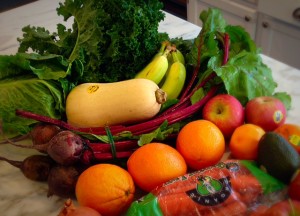 So, this happened: My sister was diagnosed with breast cancer last summer. It was a long, sometimes very painful road, (obviously much longer and more painful for her than for me), but now she is doing great. Her hair is growing back (check out the cute pixie). She’s healthy. Which is no small thing.
So, this happened: My sister was diagnosed with breast cancer last summer. It was a long, sometimes very painful road, (obviously much longer and more painful for her than for me), but now she is doing great. Her hair is growing back (check out the cute pixie). She’s healthy. Which is no small thing.
When a close family member gets cancer, it’s terrifying. (It’s also a massive dose of perspective — you come to Jesus with your priorities, values, “problems,” and relationships, all of which I can safely say my sister has nailed.) When we got the news, I was scared but I was also prepared to be there for her in any way I could. I was prepared for my mom to freak out (totally understandable). I was prepared to cook and clean and drive and take walks and visit and generally feel terrible that my little sister was so miserable. I was prepared to feel useless sometimes. I was prepared for worry and anger and even a little guilt that it was her and not me.
But one thing I was not prepared for was the can of worms that gets opened when a family member gets cancer, especially at a young age. Right away there were talks of genetic tests, family history, etc. Calls were made to aunts and cousins to confirm dates of diagnoses, ages, and outcomes. The result of all that for me, in a nutshell, was being told by two doctors that I have a “greatly increased cancer risk.”
I was sent to an oncologist to discuss my risk and options. We talked about tamoxifen, extra screenings, tests, and, finally, diet and lifestyle.
 The doctor gave me a pamphlet called, “The role of nutrition in cancer prevention: A guide to reduce the risk of cancer.” Most of the information it contains is fairly common sense: The risk factors we can control are diet, weight management, physical activity, and alcohol consumption. However I found some of the specifics interesting; it said to avoid processed soy products such as soy protein isolates and soy-based supplements, avoid processed meats (goodbye sausage, sigh), and get your nutrients from whole foods instead of supplements (with the exception of vitamin D, calcium, and Omega 3 supplements, which can be beneficial). The pamphlet agrees with every health and nutrition expert ever in recommending a diet based mostly on plants: It said to eat 7-9 servings of fruits and vegetables per day, in a wide variety of colors; also, eat more cruciferous vegetables (broccoli, cauliflower). If you eat grains, choose unprocessed whole grains. Like I said, all pretty basic, but good to be reminded of now and then.
The doctor gave me a pamphlet called, “The role of nutrition in cancer prevention: A guide to reduce the risk of cancer.” Most of the information it contains is fairly common sense: The risk factors we can control are diet, weight management, physical activity, and alcohol consumption. However I found some of the specifics interesting; it said to avoid processed soy products such as soy protein isolates and soy-based supplements, avoid processed meats (goodbye sausage, sigh), and get your nutrients from whole foods instead of supplements (with the exception of vitamin D, calcium, and Omega 3 supplements, which can be beneficial). The pamphlet agrees with every health and nutrition expert ever in recommending a diet based mostly on plants: It said to eat 7-9 servings of fruits and vegetables per day, in a wide variety of colors; also, eat more cruciferous vegetables (broccoli, cauliflower). If you eat grains, choose unprocessed whole grains. Like I said, all pretty basic, but good to be reminded of now and then.
While I was perusing the pamphlet, I asked the doctor about whether or not she recommends eating organic food. She said, “You know, I try to eat only organic. Not necessarily because it’s more nutritious, but I do think it’s healthy to avoid pesticides as much as you can.” She went to say, “And I really don’t like the thought of GMOs. What really bothers me is genetically altering plants so they can withstand even more chemical pesticides. We haven’t directly linked these to cancer, but the risk is a concern.” She also said she avoids artificial sweeteners, “I’ve always been suspicious of those,” she said.
I mentioned this conversation to my sister, and she was surprised. “My doctor wouldn’t commit to saying anything causes cancer really — at least lifestyle-wise,” she told me. Frankly, that irritates me. I think the whole “cancer prevention” thing does not get NEARLY enough play from the medical establishment. If there are things we can all be doing that reduce our risk of cancer, shouldn’t we all know about them? I know I’m naive and there is are politics (and money) involved, but I want to see breaking news on CNN about the dangers of chemicals and processed foods. Whether or not chemical pesticides have been directly shown to cause cancer, studies have linked them to lymphoma and leukemia, which are types of cancer.
Just an aside: This evidence-based nutrition pamphlet the oncologist gave me says to “Limit intake of processed sugars such as soda and candy,” but sitting on the reception desk at the cancer center where my sister got her chemo treatments was a giant bowl (I mean giant) of candy.
So, for me anyway, this is yet another reason to choose organic foods whenever possible. If you can’t afford to buy everything organic, remember the dirty dozen (foods that require the highest quantity of pesticides to grow conventionally) and at least buy the organic versions of those. And, in order to avoid processed soy and hidden GMOs, you basically have to cut out processed foods. Sorry. If you have a hankering for store-bought cookies or salad dressing, I highly recommend buying an organic brand — at least the processed soy will be non-GMO (Genetically Modified organisms are not allowed in organic foods).
It’s the beginning of summer, which for me feels like a (much needed!) fresh start. I’m not ready to try to prevent cancer with drugs, but I can do my damnedest with my diet.
If the idea that 2/3 of your meal should come from plants seems kind of daunting, here are some of my all-time favorite vegetable recipes to get you going.
Quinoa Salad with Crunchy Vegetables & Tangy Peanut Dressing

Thank you darling girl – love you and the “pixie”